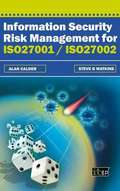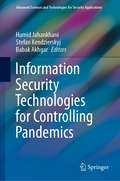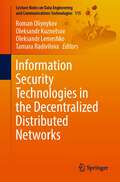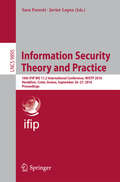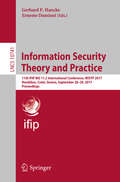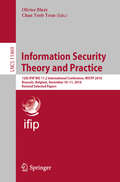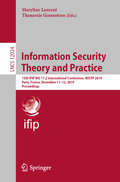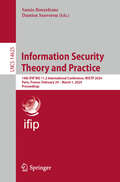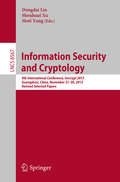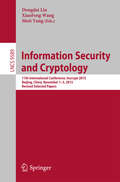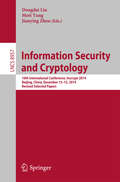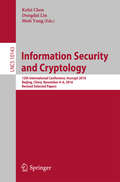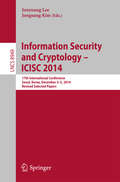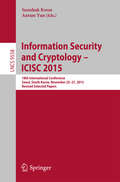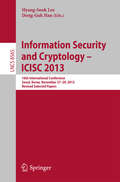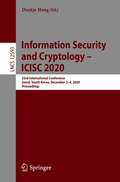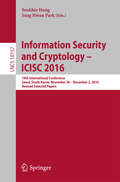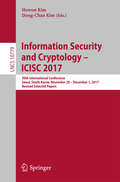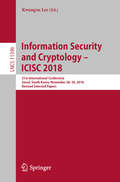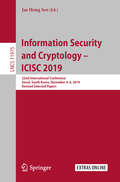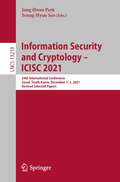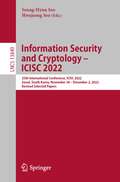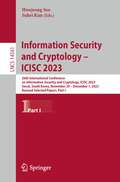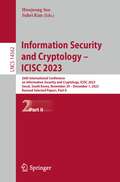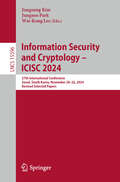- Table View
- List View
Information Security Risk Management for ISO27001 / ISO27002
by Alan Calder Steve G WatkinsThe changing global economy, together with recent corporate and IT governance developments, all provide the context within which organisations have to assess risks to the information assets on which their organisations, and the delivery of their business plan objectives, depend. Information security management decisions are entirely driven by specific decisions made as an outcome of a risk assessment process in relation to identified risks and specific information assets. Risk assessment is, therefore, the core competence of information security management.
Information Security Technologies for Controlling Pandemics (Advanced Sciences and Technologies for Security Applications)
by Babak Akhgar Hamid Jahankhani Stefan KendzierskyjThe year 2020 and the COVID-19 pandemic marked a huge change globally, both in working and home environments. They posed major challenges for organisations around the world, which were forced to use technological tools to help employees work remotely, while in self-isolation and/or total lockdown. Though the positive outcomes of using these technologies are clear, doing so also comes with its fair share of potential issues, including risks regarding data and its use, such as privacy, transparency, exploitation and ownership. COVID-19 also led to a certain amount of paranoia, and the widespread uncertainty and fear of change represented a golden opportunity for threat actors. This book discusses and explains innovative technologies such as blockchain and methods to defend from Advanced Persistent Threats (APTs), some of the key legal and ethical data challenges to data privacy and security presented by the COVID-19 pandemic, and their potential consequences. It then turns to improved decision making in cyber security, also known as cyber situational awareness, by analysing security events and comparing data mining techniques, specifically classification techniques, when applied to cyber security data. In addition, the book illustrates the importance of cyber security, particularly information integrity and surveillance, in dealing with an on-going, infectious crisis. Aspects addressed range from the spread of misinformation, which can lead people to actively work against measures designed to ensure public safety and minimise the spread of the virus, to concerns over the approaches taken to monitor, track, trace and isolate infectious cases through the use of technology. In closing, the book considers the legal, social and ethical cyber and information security implications of the pandemic and responses to it from the perspectives of confidentiality, integrity and availability.
Information Security Technologies in the Decentralized Distributed Networks (Lecture Notes on Data Engineering and Communications Technologies #115)
by Tamara Radivilova Roman Oliynykov Oleksandr Kuznetsov Oleksandr LemeshkoThe authors explore various aspects of information processing for the design of service systems, efficient management, secure storage, and transmission. In addition, the subline provides knowledge and practice in decentralized ICT technologies, including those based on blockchain. The aim of this book is to analyze and develop methods of building decentralized private databases without the presence of a trusted party, methods of data processing in encrypted form to ensure the confidentiality of information, and accessibility of the corresponding fragment of the original or transformed data. In this book it is also relevant to research methods and protocols routing in infocommunication networks, which provides load balancing in the network, and analysis of intrusion detection methods based on analysis of signatures and anomalies in network behavior (state changes) based on machine learning and fractal analysis methods.
Information Security Theory and Practice
by Javier Lopez Sara ForestiThis volume constitutes the refereed proceedings of the 10th IFIP WG 11. 2 International Conference on Information Security Theory and Practices, WISTP 2016, held in Heraklion, Crete, Greece, in September 2016. The 13 revised full papers and 5 short papers presented together in this book were carefully reviewed and selected from 29 submissions. WISTP 2016 sought original submissions from academia and industry presenting novel research on all theoretical and practical aspects of security and privacy, as well as experimental studies of fielded systems, the application of security technology, the implementation of systems, and lessons learned. The papers are organized in topical sections on authentication and key management; secure hardware systems; attacks to software and network systems; and access control and data protection.
Information Security Theory and Practice: 11th IFIP WG 11.2 International Conference, WISTP 2017, Heraklion, Crete, Greece, September 28–29, 2017, Proceedings (Lecture Notes in Computer Science #10741)
by Ernesto Damiani Gerhard P. HanckeThis volume constitutes the refereed proceedings of the 11th IFIP WG 11.2 International Conference on Information Security Theory and Practices, WISTP 2017, held in Heraklion, Crete, Greece, in September 2017. The 8 revised full papers and 4 short papers presented were carefully reviewed and selected from 35 submissions. The papers are organized in the following topical sections: security in emerging systems; security of data; trusted execution; defenses and evaluation; and protocols and algorithms.
Information Security Theory and Practice: 12th IFIP WG 11.2 International Conference, WISTP 2018, Brussels, Belgium, December 10–11, 2018, Revised Selected Papers (Lecture Notes in Computer Science #11469)
by Olivier Blazy Chan Yeob YeunThis volume constitutes the refereed proceedings of the 12th IFIP WG 11.2 International Conference on Information Security Theory and Practices, WISTP 2018, held in Brussels, Belgium, in December 2018. The 13 revised full papers and 2 short papers presented were carefully reviewed and selected from 45 submissions. The papers are organized in the following topical sections: real world; cryptography; artificial learning; cybersecurity; and Internet of things.
Information Security Theory and Practice: 13th IFIP WG 11.2 International Conference, WISTP 2019, Paris, France, December 11–12, 2019, Proceedings (Lecture Notes in Computer Science #12024)
by Maryline Laurent Thanassis GiannetsosThis volume constitutes the refereed proceedings of the 13th IFIP WG 11.2 International Conference on Information Security Theory and Practices, WISTP 2019, held in Paris, France, in December 2019. The 12 full papers and 2 short papers presented were carefully reviewed and selected from 42 submissions. The papers are organized in the following topical sections: authentication; cryptography; threats; cybersecurity; and Internet of Things.
Information Security Theory and Practice: 14th IFIP WG 11.2 International Conference, WISTP 2024, Paris, France, February 29 – March 1, 2024, Proceedings (Lecture Notes in Computer Science #14625)
by Samia Bouzefrane Damien SauveronThis volume constitutes the refereed proceedings of the 14th IFIP WG 11.2 International Conference on Information Security Theory and Practices, WISTP 2024, held in Paris, France. The 12 full papers presented were carefully reviewed and selected from 30 submissions. The papers presented in this proceedings focus on emerging trends in security and privacy, including experimental studies of fielded systems while exploring the application of security technology, and highlighting successful system implementations.
Information Security and Cryptology
by Moti Yung Dongdai Lin Shouhuai XuThis book constitutes the thoroughly refereed post-conference proceedings of the 9th International Conference on Information Security and Cryptology, Inscrypt 2013, held in Guangzhou, China, in November 2013. The 21 revised full papers presented together with 4 short papers were carefully reviewed and selected from 93 submissions. The papers cover the topics of Boolean function and block cipher, sequence and stream cipher, applications: systems and theory, computational number theory, public key cryptography, has function, side-channel and leakage, and application and system security.
Information Security and Cryptology
by Moti Yung Dongdai Lin Xiaofeng WangThis book constitutes the thoroughly refereed post-conference proceedings of the 11th International Conference on Information Security and Cryptology, Inscrypt 2015, held in Beijing, China in November 2015. The 27 revised full papers presented were carefully reviewed and selected from 79 submissions. The papers are organized in topical sections on hash function; signature schemes; symmetric ciphers; elliptic curve and cryptographic fundamentals; Web and applications security; cloud security; key management and public key encryption; zero knowledge and secure computations; software and mobile security.
Information Security and Cryptology
by Moti Yung Dongdai Lin Jianying ZhouThis book constitutes the thoroughly refereed post-conference proceedings of the 10th International Conference on Information Security and Cryptology, Inscrypt 2014, held in Beijing, China, in December 2014. The 29 revised full papers presented were carefully reviewed and selected from 93 submissions. The papers are organized in topical sections on privacy and anonymity, multiparty and outsource computation, signature and security protocols, lattice and public key cryptography, block cipher and hash function, authentication and encryption, elliptic curve, and cryptographic primitive and application.
Information Security and Cryptology
by Moti Yung Dongdai Lin Kefei ChenThis book constitutes the refereed proceedings of the 12th International Conference on Information Security Conference, ISC 2009, held in Pisa, Italy, September 7-9, 2009. The 29 revised full papers and 9 revised short papers presented were carefully reviewed and selected from 105 submissions. The papers are organized in topical sections on analysis techniques, hash functions, database security and biometrics, algebraic attacks and proxy re-encryption, distributed system security, identity management and authentication, applied cryptography, access control, MAC and nonces, and P2P and Web services.
Information Security and Cryptology - ICISC 2014
by Jooyoung Lee Jongsung KimThis book constitutes the thoroughly refereed post-conference proceedings of the 17th International Conference on Information Security and Cryptology, ICISC 2014, held in Seoul, South Korea in December 2014. The 27 revised full papers presented were carefully selected from 91 submissions during two rounds of reviewing. The papers provide the latest results in research, development and applications in the field of information security and cryptology. They are organized in topical sections on RSA security, digital signature, public key cryptography, block ciphers, network security, mobile security, hash functions, information hiding and efficiency, cryptographic protocol, and side-channel attacks.
Information Security and Cryptology - ICISC 2015
by Soonhak Kwon Aaram YunThis book constitutes the thoroughly refereedpost-conference proceedings of the 18th International Conference on InformationSecurity and Cryptology, ICISC 2015, held in Seoul, South Korea, in November2015. The 23 revised full papers presented were carefullyselected from 84 submissions during two rounds of reviewing and improvement. The papers provide the latest results in research, development and applicationsin the field of information security and cryptology. They are grouped aroundthe following topics: digital signatures; public-key cryptography; block ciphercryptanalysis; elliptic curve cryptography; protocols; security; side-channelattacks.
Information Security and Cryptology -- ICISC 2013
by Hyang-Sook Lee Dong-Guk HanThis book constitutes the thoroughly refereed post-conference proceedings of the 16th International Conference on Information Security and Cryptology, ICISC 2013, held in Seoul, Korea in November 2013. The 31 revised full papers presented together with 2 invited talks were carefully selected from 126 submissions during two rounds of reviewing. The papers provide the latest results in research, development and applications in the field of information security and cryptology. They are organized in topical sections on secure multiparty computation, proxy re-encryption, side channel analysis and its countermeasures, cryptanalysis, embedded system security and its implementation, primitives for cryptography, digital signature, security protocol, cyber security, and public key cryptography.
Information Security and Cryptology – ICISC 2020: 23rd International Conference, Seoul, South Korea, December 2–4, 2020, Proceedings (Lecture Notes in Computer Science #12593)
by Deukjo HongThis book constitutes selected papers from the 23rd International Conference on Information Security and Cryptology, ICISC 2020, held in Seoul, South Korea, in December 2020. Due to the COVID-19, the confere was held online.The total of 15 papers presented in this volume were carefully reviewed and selected from 51 submissions. The aim of this conference was to provide an international forum for the latest results of research, development, and applications within the field of information security and cryptology.
Information Security and Cryptology – ICISC 2016
by Seokhie Hong Jong Hwan ParkThis book constitutes revised selected papers from the 19th International Conference on Information Security and Cryptology, ICISC 2016, held in Seoul, South Korea, in November/December 2016. The 18 full papers presented in this volume were carefully reviewed and selected from 69 submissions. There were organized in topical sections named: protocols; lattice cryptography; encryption; implementation and algorithms; signatures and protocol; and analysis.
Information Security and Cryptology – ICISC 2017: 20th International Conference, Seoul, South Korea, November 29 - December 1, 2017, Revised Selected Papers (Lecture Notes in Computer Science #10779)
by Howon Kim Dong-Chan KimThis book constitutes revised selected papers from the 20th International Conference on Information Security and Cryptology, ICISC 2017, held in Seoul, South Korea, in November/December 2017. The total of 20 papers presented in this volume were carefully reviewed and selected from 70 submissions. The papers were organized in topical sections named: symmetric key encryption; homomorphic encryption, side channel analysis and implementation; broadcast encryption; elliptic curve; signature and protocol; and network and system security.
Information Security and Cryptology – ICISC 2018: 21st International Conference, Seoul, South Korea, November 28–30, 2018, Revised Selected Papers (Lecture Notes in Computer Science #11396)
by Kwangsu LeeThis book constitutes revised selected papers from the 21st International Conference on Information Security and Cryptology, ICISC 2018, held in Seoul, South Korea, in November 2018. The total of 21 papers presented in this volume were carefully reviewed and selected from 49 submissions. The papers were organized in topical sections named: public-key encryption and implementation; homomorphic encryption; secure multiparty computation; post-quantum cryptography; secret sharing and searchable encryption; storage security and information retrieval; and attacks and software security.
Information Security and Cryptology – ICISC 2019: 22nd International Conference, Seoul, South Korea, December 4–6, 2019, Revised Selected Papers (Lecture Notes in Computer Science #11975)
by Jae Hong SeoThis book constitutes revised selected papers from the 22nd International Conference on Information Security and Cryptology, ICISC 2019, held in Seoul, South Korea, in December 2019. The total of 18 papers presented in this volume were carefully reviewed and selected from 43 submissions. The papers were organized in topical sections named: public-key encryption and implementation; homomorphic encryption; secure multiparty computation; post-quantum cryptography; secret sharing and searchable encryption; storage security and information retrieval; and attacks and software security.
Information Security and Cryptology – ICISC 2021: 24th International Conference, Seoul, South Korea, December 1–3, 2021, Revised Selected Papers (Lecture Notes in Computer Science #13218)
by Jong Hwan Park Seung-Hyun SeoThis book constitutes selected papers from the 24th International Conference on Information Security and Cryptology, ICISC 2021, held in Seoul, South Korea, in December 2021. The total of 23 papers presented in this volume were carefully reviewed and selected from 63 submissions. The papers are arranged by topic: Cryptographic Protocol in Quantum Computer Age; Security Analysis of Hash Algorithm; Security analysis of Symmetric Key Encryption Algorithm; Fault and Side-Channel Attack; Constructions and Designs; Quantum Circuit; Efficient Implementation. The aim of this conference was to provide an international forum for the latest results of research, development, and applications within the field of information security and cryptology.
Information Security and Cryptology – ICISC 2022: 25th International Conference, ICISC 2022, Seoul, South Korea, November 30 – December 2, 2022, Revised Selected Papers (Lecture Notes in Computer Science #13849)
by Seung-Hyun Seo Hwajeong SeoThis book constitutes the refereed proceedings of the 25th International Conference, ICISC 2022, held in Seoul, South Korea, during November 30–December 2, 2022. The 24 full papers included in this book were carefully reviewed and selected from 69 submissions. They were organized in topical sections as follows: Public Key Encryption with Hierarchical Authorized Keyword Search, Implicit Key-stretching Security of Encryption Schemes.
Information Security and Cryptology – ICISC 2023: 26th International Conference on Information Security and Cryptology, ICISC 2023, Seoul, South Korea, November 29 – December 1, 2023, Revised Selected Papers, Part I (Lecture Notes in Computer Science #14561)
by Hwajeong Seo Suhri KimThis book constitutes the refereed proceedings of the 26th International Conference on Information Security and Cryptology on Information Security and Cryptology – ICISC 2023, held in Seoul, South Korea, during November 29–December 1, 2023The 31 full papers included in this book were carefully reviewed and selected from 78 submissions. They were organized in topical sections as follows:Part I: cryptanalysis and quantum cryptanalysis; side channel attack; signature schemes.Part II: cyber security; applied cryptography; and korean post quantum cryptography.
Information Security and Cryptology – ICISC 2023: 26th International Conference on Information Security and Cryptology, ICISC 2023, Seoul, South Korea, November 29 – December 1, 2023, Revised Selected Papers, Part II (Lecture Notes in Computer Science #14562)
by Hwajeong Seo Suhri KimThis book constitutes the refereed proceedings of the 26th International Conference on Information Security and Cryptology on Information Security and Cryptology – ICISC 2023, held in Seoul, South Korea, during November 29–December 1, 2023The 31 full papers included in this book were carefully reviewed and selected from 78 submissions. They were organized in topical sections as follows:Part I: Cryptanalysis and Quantum Cryptanalysis; Side Channel Attack; Signature Schemes.Part II: Cyber Security; Applied Cryptography; and Korean Post Quantum Cryptography.
Information Security and Cryptology – ICISC 2024: 27th International Conference, Seoul, South Korea, November 20–22, 2024, Revised Selected Papers (Lecture Notes in Computer Science #15596)
by Jongsung Kim Jungsoo Park Wai-Kong LeeThis book constitutes the refereed proceedings of the 27th International Conference on Information Security and Cryptology on Information Security and Cryptology – ICISC 2024, held in Seoul, South Korea, during November 20–22, 2024. The 23 full papers included in this book were carefully reviewed and selected from 58 submissions. They were organized in topical sections as follows: cryptanalysis of block ciphers; signature schemes; applied cryptography; quantum cryptography and deep learning based analysis; side-channel and automotive attack; cyber security; and AI security.
